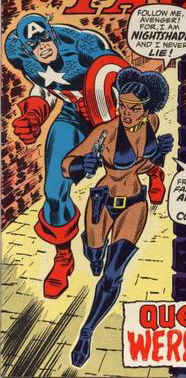An interesting article on Io9 of all places, looking at how James Rhodes, longtime Iron Man sidekick/replacement, is just about the perfect stereotypical Black superhero:
By accident more than design, Rhodes has ended up possessing multiple characteristics that sum up the black superhero experience. Sure, he may not have the word “Black” in his superhero name (See: Black Panther, Black Lightning, Black Goliath, the Black Racer or even the Black Musketeers. Yes, that’s right; I said The Black Musketeers), and he may not ride a skateboard – Or not that we’ve seen, at least, who knows what he does in his spare time? – but look how many other checkboxes he’s managed to tick
He’s a sidekick who became a replacement for the original white hero, he’s edgy and…
He’s A Cyborg
Yes, James Rhodes is a cyborg these days. Just like DC’s Cyborg, from Teen Titans. Or Marvel’s Deathlok. Or DC’s John Henry Irons**. Or Marvel’s Bishop, from the X-Men. Or even Iron Fist’s girlfriend, Misty Knight (one of the Heroes For Hire/Daughters of The Dragon). What is it about high-profile black characters finding themselves turned into part-robot? Some kind of clever commentary on black culture being assimiliated into the white corporate machine, or white creators having a fear of a black robotic planet? I have no idea, but it’s kind of odd, isn’t it?
That so many prominent Black heroes are cyborgs might just be the result of a relatively small sampling size. since there are far fewer Black heroes than there are white, even a few cyborgs are noticable. The examples mentioned all (with the exception of Misty Knight) are all eighties or early nineties creations, which was a time crazy for cyborgs anyway. Just like every Japanese character from that time was a ninja.

One cliche the article misses is that Black characters not just have names that shout their Blackness — Black Panther, BlackLightning, Black McBlack, queen of the Black-Black — but also show just a litttle bit more skin than yer average white hero. A shirt open to the navel is almost de rigeur for a Black hero, while a heroine, well, bras and panties is the most they could hope for. Case in point –>
The painful truth about these cliches is that these characters were mostly created by well meaning white writers, in an attempt to address the honkiness of the Marvel and DC universes. Which explains the substitute heroes and sidekicks, because it’s always easier to introduce a variation on a proven concept than a completely original character. Even the few Black writers in comics, like Christopher Priest and Dwayne McDuffie haven’t had much luck creating new, non-derivative Black heroes, though the former worked wonders with Black Panther and the latter had a memorable run on the nineties version of Deathlok. But new characters, not tied to an existing title? Always difficult to sell, especially since the Big Two doesn’t believe black heroes will sell at all.
Another problem is that while the creators might have been well intended their experience with Black culture (and perhaps, Black people in general) often seems pretty limited, hence the tendency to follow a given decade’s pop culture cliches (disco pimps in the seventies, hiphop hard men in the nineties). Characterisation by MTV, so to speak. What’s more, the mere fact a character is Black is often supposed to be enough to distinguish them…